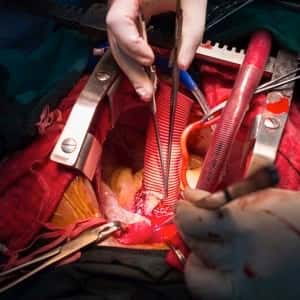
When most people think about side effects from antibiotics they imagine some digestive distress. Indigestion or diarrhea are perceived to be the most common complications of such medications. But one class of antibiotics (fluoroquinolones, FQs or quinolones for short) may trigger some unexpected and dangerous adverse reactions, as this reader points out.
Q. Four years ago, my 93-year-old father fell and his neighbor took him to the ER. When the hospital called, I said I would come right away. I warned them NOT to give him any quinolone antibiotics because I’d had a bad experience with such drugs myself. I also reminded the hospital that he had an aortic aneurysm and shouldn’t be given warfarin (Coumadin).
By the time I arrived, Dad had no idea who I was. Before the fall he was sharp as a tack.
I was told they presumed he had pneumonia (although he did not) and gave him Levaquin. It caused him to hallucinate for the next six weeks, until his aneurysm ruptured and he died.
I just read that quinolones can trigger aortic aneurysms and I am sure that the Levaquin contributed to my father’s death.
A. An article in JAMA Internal Medicine (online, Oct. 5, 2015) reveals that quinolone-type antibiotics are associated with a greater risk of aortic aneurysm.
In this condition, the main artery leaving the heart develops a weak spot in its wall and balloons out. Sometimes it tears or ruptures. This complication is rare, but it happens twice as often in people taking a quinolone antibiotic like levofloxacin (Levaquin). As far as we can tell, FDA has not yet required warnings for this potentially fatal reaction.
Quinolone antibiotics such as ciprofloxacin (Cipro), levofloxacin or moxifloxacin (Avelox) can cause hallucinations, and other readers have written about their own frightening experiences with such antibiotics.
More than 20 million people receive a prescription for one of these floxacin-type antibiotics each year. A majority do not experience deadly side effects. But it has taken the FDA a long time to recognize some very serious reactions.
Neuropathy (Nerve Damage) Can Be Devastating:
In August, 2013, the FDA issued a warning about quinolone and nerve damage. The agency noted that neuropathy can occur shortly after starting a fluoroquinolone antibiotic and the damage can be permanent. Symptoms include burning, tingling, pain, numbness and weakness in extremities.
Jack in San Jose, CA writes:
“I also took only two (2) Levaquin pills, and my wife had to call 911 since I was unable to lift myself off the couch. This was in February, 2015. As of today, I am suffering terrible pain in my legs, arms, feet, hands, arms, hips and every joint in my body. I force myself to walk so I reduce muscle loss, which is a real problem at present.
“You would think that after 5 months, things would be improving, but the opposite is occurring. The symptoms are worse than ever. The pain at times is unbearable and relentless. All this from 2 pills. Those 2 pills caused kidney failure, liver infection, bladder infection and a week in intensive care. It also took over two months to be able to walk again and regain some strength in my legs.
“Yet today (many months later), my primary care doctor says she doesn’t believe that this was caused by Levaquin. That’s when I asked her if she had read the black box warnings, and she had not. My wish is that she would have to live with my pain for one week. Then we’ll see her response to this drug. I was not informed that nerve damage could result when I was prescribed the drug. I stopped it after the second pill or I would most likely be dead.”
Here is a report from H.E.K.:
“WOW, I was amazed to read this on the prescriptions for Cipro, Levaquin and Avelox. I have taken these over the years for infections and could not figure out why I have neuropathy. I am not a diabetic, nor close to being one.
“My MD says the neuropathy is permanent. Is that true?
“I sure am mad as hell about this that the MD doesn’t warn us about this side effect. It seems as if these drugs are given to us much too quickly and maybe really without a good reason.”
Sometimes a fluoroquinolone is an essential drug. But sometimes these powerful antibiotics are misused. According to the publication Worst Pills, Best Pills News (October, 2015):
“One of the biggest-selling and most overprescribed classes of antibiotics in the United States is the family called fluoroquinolones…Such misuse of fluoroquinolones exposes patients to the risk of a variety of potentially serious, avoidable adverse effects.”
Symptoms of FQ Nerve Damage
- Pain
- Burning
- Tingling
- Numbness
- Weakness
- Changes in sensation to light touch, pain or temperature, or the sense of body position
Other Fluoroquinolone Complications:
- Digestive distress, nausea, diarrhea, constipation, stomach pain, heartburn, vomiting
- Headache, dizziness
- Agitation, anxiety, irritability, restlessness, confusion
- Insomnia
- Tendon problems, tendinitis, tendon rupture
- Retinal detachment
- Allergic reactions, skin rash, anaphylaxis (life-threatening reaction requiring immediate medical attention!)
- Super-infections, including C. diff diarrhea
- Hallucinations, psychosis, seizures
- Depression, suicidal thoughts or actions
- Irregular heart rhythms, torsades de pointes, QT prolongation
- Kidney or liver damage
- Blood disorders
- Arthritis, muscle pain, weakness
If you want to know more about how people have fared with fluoroquinolones, here is a link to 188 comments:
Cipro, Floxin and Levaquin Cause Chaos
Share your own story below and please vote on this article at the top of the page.

